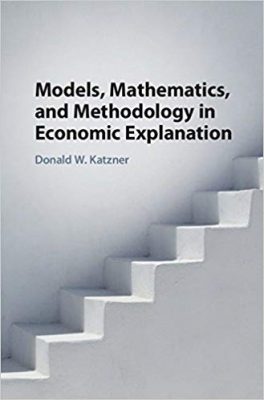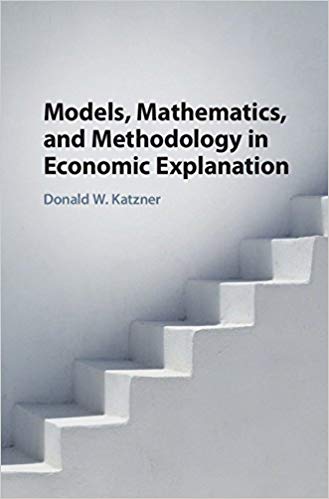 Author: Donald W. Katzner
Author: Donald W. Katzner
Publisher: Cambridge University Press – 249 pages
Book Review by: Sonu Chandiram
The purpose of this book, according to its author Donald Katzner, an economics professor, is to bring into focus the interrelations between three elements or areas of investigation involved in economic explanation, as well as the connections between those areas and economic explanation itself:
- First, the building of models as part of one possible approach to explaining economic phenomena
- Second, certain critical aspects of the mathematization that model construction frequently employs
- Third, Some features of the relevant methodological foundations upon which the model- building explanatory program is based
Towards achieving these goals, the author has developed a work that discusses relevant matters in these chapters listed below that provide you a broad overview of what you will find in it:
- Science and Economics
- Economic Models and Explanation
- The Stages of Model Building in Economics
- Models and Mathematics
- Models and Measurement (or Lack Thereof)
- Issues Relating to the Construction of Models from Scratch
- An Example: The Efficiency of Organizational Forms
- The Implicit Assumption Requirement of Later-Stage Model Building
- Ordinality and the Adequacy of Analytic Specification
- Categories of Models
Is economics a science wherein precise, quantified outcomes are expected, just as in the physical sciences such as chemistry and physics? Economics has not reached that stage of development, but perhaps one day it could get there. The author of this book on economic model-building seems to want economics to provide:
- Adequate explanation on why certain economic phenomena occur
- Precise expectations of certain economic outcomes.
But there are a number of obstacles along the path to fulfill the above two needs. He calls these ‘conceptual traps’ that “arise in moving to real-world explanation.”
The author’s primary concern is “in the more practical and operational aspects of economic model-building in a how-to-do-it sense.”
“Science, as practiced by physicist, chemists, biologists, and other physical scientists, is no doubt one of our most successful and respected intellectual enterprises. Clearly, that success and respect have been intertwined with each other. On the one hand, science is looked up to because of its ability to explain and predict. Science explains the relations and causations that exist between facts and events, and the phenomena of the world,” the author begins his first chapter Science and Economics.
He then goes on to say that the advancements in the physical sciences, particularly in medical science, have resulted in enormous extension of, and improvement in the quality of human life. Advancements in other physical sciences have provided us the comforts of modern life such as air conditioning, automobiles, central heating, the computer, refrigeration, television, and more.
On the other hand, the outcomes in the social sciences, including economics, have been nowhere near the successes of the physical sciences. Nevertheless, the objective of the social sciences including economics is also akin to the physical sciences: to provide explanation of phenomena as well as predict outcomes, once the necessary facts and data are available. The main difference is that in economics, human behavior is the subject of study, not physical phenomena.
The outcomes of relationships and interactions between and among people in different settings are difficult to account for, and more difficult, to predict.
This is an interesting, intriguing book on economic explanation and economic model-building that sets you thinking about the differences between the physical and the social sciences,
Author:
Donald W. Katzner is Professor of Economics and former Department Chair at the University of Massachusetts in Amherst. His published research spans several areas, including his microeconomic and general equilibrium theory; the methodology of building models and of analyzing phenomena when measures of appropriate variables are neither available nor reasonably constructible; the analysis of uncertain economic phenomena when it is inappropriate to employ notions of probability; the impact of culture on economic behavior; and organizational issues within the economic firm.







